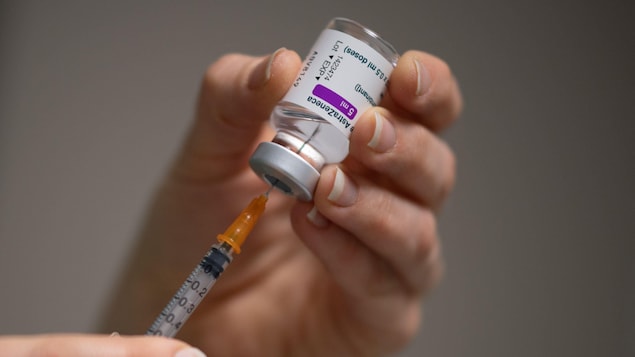In the case of AstraZeneca as in the case of Johnson & Johnson, suspicion arose after cases of thrombosis (formation of blood clots) in a small number of vaccinated people.
These are not normal clots, like simple phlebitis, but rather unusual clots.
On the other hand, it is atypical by its location: They affect the veins in the brain (cerebral venous sinus thrombosis) and, to a lesser extent, the abdomen.
, The European Medicines Agency (EMA) reported on AstraZeneca on April 7.
Same for Johnson & Johnson, which they are, too Thrombosis of the cerebral venous sinuses
That was noticed, on Tuesday, the US health authorities, the Food and Drug Administration, and the Centers for Disease Control, said that The use of this vaccine has been suspended in the United States.
In addition to their location, these clots are interesting, because they are accompanied by a decrease in the level of platelets, and these cells help the blood to clot.
Ironically, this can also cause bleeding in addition to blood clots.
Treatment for this specific type of blood clot differs from what is usually given.
, Warned the FDA and the CDC.
On April 7, the EMA realized for the first time that these very rare blood problems could be caused by the AstraZeneca vaccine.
Both vaccines Probable cause
From these very atypical events, for his part, was estimated on Tuesday by an official in the US Food and Drug Administration, Peter Marks.
The Johnson & Johnson vaccine is authorized in the European Union (under the name Janssen), but not yet administered. AstraZeneca is used in the European Union, but is not yet licensed in the United States.
Adenocarcinoma
Although nothing has been proven yet, it is increasingly likely that these blood problems are related to the technology these vaccines are based on.
They are both called Viral vectors
We take another virus as support, which we modify so that it carries genetic information in the body to fight COVID-19.
They both use a very common type of virus called adenovirus as a carrier. She chose AstraZeneca for the chimpanzee adenovirus, and Johnson & Johnson for the human adenovirus.
The fact that similar problems have been observed with these vaccines It may indicate that the problem lies with the adenovirus vector
Twitter verdict, David Fisman, University of Toronto epidemiologist.
Everything indicates that it is related to the adenovirus vector
Matteo Molimar, a French pharmacologist, added, also on Twitter. Actually, These cases do not yet exist with RNA vaccines
, That of Pfizer-BioNTech and Moderna, who use another technology, messenger RNA.
It remains to be seen whether this type of blood problem has also been observed with the Russian Sputnik V vaccine, which also uses two adenoviruses as vectors. It is authorized in about 60 countries at the moment, but not in the European Union or the United States.
Specialists prefer the abnormal and strong immune response caused by these vaccines.
In a study published online on March 28 and on AstraZeneca, German and Austrian researchers came up with another mechanism already known.
The observed phenomenon Clinically similar heparin-induced thrombocytopenia (HIT)
These researchers write led by Andreas Greenscher (University of Greifswald).
HIT is a serious and rare immune reaction that occurs in some patients with the anticoagulant drug heparin.
This is Reasonable explanation
, The EMA commented on April 7, calling for further studies.
Even German and Austrian researchers suggest giving a name to the phenomenon observed with the AstraZeneca vaccine (English abbreviation VIPIT).
This is the basic question.
Reactions are rare
In AstraZeneca’s case, there were, as of April 4, 222 cases of these atypical clots out of 34 million injections performed in the European Economic Area (European Union, Iceland, Norway, and Liechtenstein) and the United Kingdom. , According to the EMA. . This resulted in 18 deaths (as of March 22).
A blood clot has occurred Within two weeks after vaccination
According to the EMA.
In the case of Johnson & Johnson, US authorities have identified six cases (including one death) out of more than 6.8 million doses taken in the United States. Symptoms occurred 6 to 13 days after vaccination
, According to the FDA and CDC.
But as with any drug, knowing the risks is not enough: it must be weighed against the benefits the product provides. This is called the benefit-risk balance.
Coronavirus COVID-19 poses a risk of hospitalization and death. The reported thromboembolism / low platelet combination is very rare, and the overall benefit of the vaccine in preventing COVID-19 outweighs the risks of side effects.
, Insisted on the EMA on April 7 around AstraZeneca.
Either way, young women seem particularly anxious.
Includes most cases seen with AstraZeneca Women under the age of 60
According to the EMA. The six cases identified in the United States in relation to Johnson & Johnson are Women ages 18 to 48
.
But it is too early to come to a conclusion. Based on the information currently available, no specific risk factor has been identified.
, EMA commented about AstraZeneca.
However, after the first wave of suspension in mid-March, several countries decided not to administer the AstraZeneca vaccine below a certain age: 30 years in the United Kingdom, 55 years in France, Belgium and Canada, 60 years to Germany and the Netherlands or 65 to Sweden and Finland.
We don’t have just one vaccine, we have multiple vaccines. That’s why booking AstraZeneca for Seniors makes sense to me
Virologist from Goethe University in Frankfurt, Sandra Sissek, commented on the journal Science.
Once again, this logic is based on the balance between risks and benefits, which varies according to age: the older we get, the greater the risk of severe infection from COVID-19, and the more in our interest to be vaccinated with AstraZeneca, despite the seriousness of the effects. Side.
The British health authorities have released a comparative table to support this reasoning. On the one hand, it compares the risks of admission to intensive care and on the other hand the risks of side effects caused by the vaccine, by age and over a period of 16 weeks.
According to this schedule, when the virus spreads strongly, the risk that COVID-19 causes is six times greater than the risk posed by the vaccine in the 20-29 age group. But it gets 600 times more important when we move into the 60-69 age group.
Norway and Denmark have taken a tougher choice than just age limits, by stopping the AstraZeneca vaccine completely for now.

“Total coffee aficionado. Travel buff. Music ninja. Bacon nerd. Beeraholic.”







More Stories
Presidential 2024 | Biden is ready to discuss with Trump
Ukraine: Two dead in territories occupied by Moscow and Russia
Overtourism in Venice | Paid entry: Tourism “must change,” according to the mayor